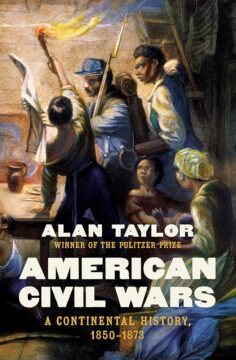Richard Carwardine at Literary Review:
 A mountain of historical studies testifies to enduring interest in the American Civil War, a conflict still politically relevant in a nation riven over how to remember it. Those doubting that there is anything fresh to say about the bloodiest event in the republic’s history should read Pulitzer Prize winner Alan Taylor’s brilliant, panoramic account of the conflict. Applying a wide continental lens, he explores this crux of United States history and how it shook neighbouring Mexico and Canada. In all three settings, liberals and social and political conservatives were involved in parallel struggles to build a modern nation. After a French invasion, the creation of a short-lived monarchy and a devastating civil war, the Liberal Party leader Benito Juárez returned to power in Mexico. Fearing the growing power and rapacity of the United States, meanwhile, Canadians navigated internal divisions to create a continental confederation. And in the United States, the pulsing heart and geographical centre of events, Abraham Lincoln’s Union forces subdued the reactionary and rebel slave power to achieve emancipation and the constitutional basis for a more liberal and democratic nation.
A mountain of historical studies testifies to enduring interest in the American Civil War, a conflict still politically relevant in a nation riven over how to remember it. Those doubting that there is anything fresh to say about the bloodiest event in the republic’s history should read Pulitzer Prize winner Alan Taylor’s brilliant, panoramic account of the conflict. Applying a wide continental lens, he explores this crux of United States history and how it shook neighbouring Mexico and Canada. In all three settings, liberals and social and political conservatives were involved in parallel struggles to build a modern nation. After a French invasion, the creation of a short-lived monarchy and a devastating civil war, the Liberal Party leader Benito Juárez returned to power in Mexico. Fearing the growing power and rapacity of the United States, meanwhile, Canadians navigated internal divisions to create a continental confederation. And in the United States, the pulsing heart and geographical centre of events, Abraham Lincoln’s Union forces subdued the reactionary and rebel slave power to achieve emancipation and the constitutional basis for a more liberal and democratic nation.
Taylor’s lively account of the conflict in the United States follows mostly familiar lines. Insisting that enslavement was a positive good for the people of African origin and that slavery had to grow to survive, Southerners demanded the right to settle the vast western territories beyond the Mississippi.
more here.
Enjoying the content on 3QD? Help keep us going by donating now.
